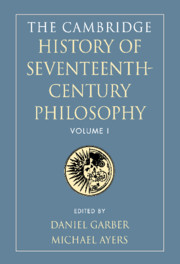Book contents
- Frontmatter
- Introduction
- I The context of seventeenth-century philosophy
- II Logic, language, and abstract objects
- 4 Logic in the seventeenth century preliminary remarks and the constituents of the proposition
- 5 Proposition and judgement
- 6 Deductive reasoning
- 7 Method and the study of nature
- 8 Universals, essences, and abstract entities
- 9 Individuation
- III God
- IV Body and the physical world
- V Spirit
- Bibliographical appendix
- Bibliography
- References
7 - Method and the study of nature
from II - Logic, language, and abstract objects
Published online by Cambridge University Press: 28 March 2008
- Frontmatter
- Introduction
- I The context of seventeenth-century philosophy
- II Logic, language, and abstract objects
- 4 Logic in the seventeenth century preliminary remarks and the constituents of the proposition
- 5 Proposition and judgement
- 6 Deductive reasoning
- 7 Method and the study of nature
- 8 Universals, essences, and abstract entities
- 9 Individuation
- III God
- IV Body and the physical world
- V Spirit
- Bibliographical appendix
- Bibliography
- References
Summary
Historical discussion of method in the seventeenth century has long focused on the supposed development of ‘modern scientific method’, attempting thereby to explain the Scientific Revolution. However, doubt is now frequently expressed, on both philosophical and historical grounds, about the legitimacy of such an approach. Even leaving aside those arguments denying the very possibility, let alone existence, of a determinate and efficacious ‘scientific method’, the search for historical understanding through the location of its first appearance increasingly seems quixotic. As a consequence, it can now be asserted that an examination of seventeenth-century ‘method’ in the investigation of nature will have historical validity only if it respects and interprets the intellectual categories of the time — that is, if it focuses on ‘method’, not ‘methodology’. This essay, therefore, concerns ‘method’ as a logical and philosophical category; it does not purport to examine or reconstruct the procedures used by philosophers in producing new knowledge, except to the extent that these involved explicit appeal to ‘method’.
Those who talked of a ‘method’ or ‘methods’ capable of generating and organising natural knowledge usually rendered this concept plausible in the context of essentialism. Hence the world was seen as being composed of essences, or natural kinds (rather than of individuals classifiable only on conventional grounds). The essences of things, furthermore, were discoverable by rational or empirical means, and the resultant knowledge was certain rather than probable. The discoverability of such knowledge was in turn sustained by talk of effective ‘methods’. Throughout the century, therefore, debates about method formed part of broader contentions about the nature of knowledge itself.
- Type
- Chapter
- Information
- The Cambridge History of Seventeenth-Century Philosophy , pp. 147 - 177Publisher: Cambridge University PressPrint publication year: 2000
References
- 17
- Cited by



